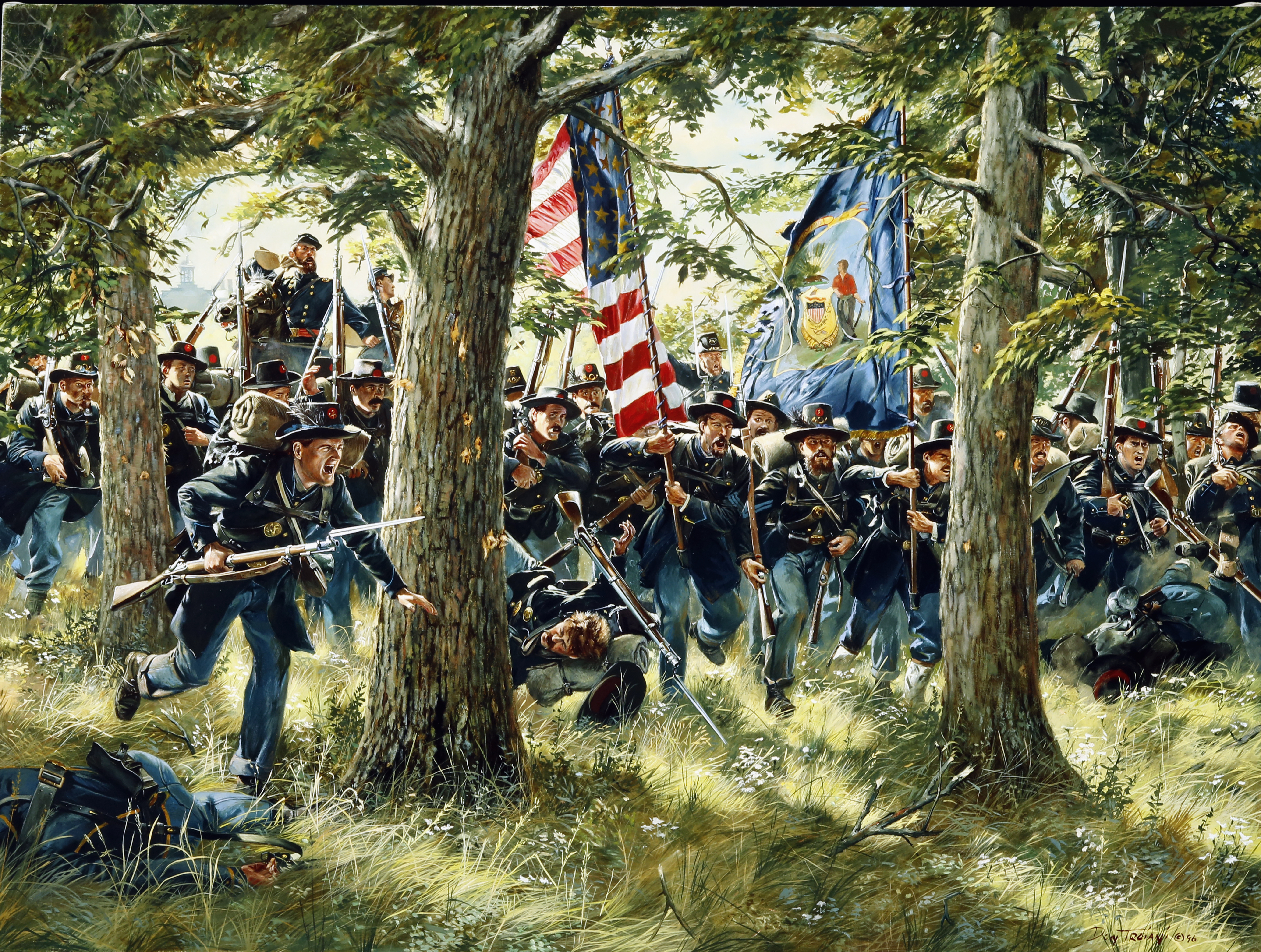The War in Their Words: An Iron Brigade captain recounts his regiment’s epic Gettysburg fight
Few Civil War regiments achieved a record as distinguished as that of the 2nd Wisconsin Infantry of the Iron Brigade. In his classic Regimental Losses in the American Civil War published in 1889, William F. Fox noted that the 2nd “sustained the greatest percentage of loss of any in the entire Union Army.” At Gettysburg, Fox notes, the regiment sustained a casualty rate of 77 percent.
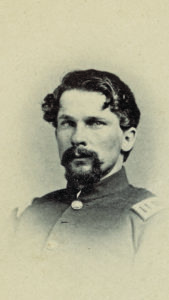
When the survivors of the 2nd Wisconsin mustered out of service in Madison in June 1864, only 173 officers and men stood in the ranks. Their commanding officer at the time was Captain George Henry Otis. A native of the state of New York, Otis worked for a newspaper in Mineral Point, Wis., in the late 1850s while also serving as secretary of a local militia company, the Mineral Guards. Undoubtedly due to his militia experience, Otis held the rank of 4th corporal at the time of his enlistment in Company I, 2nd Wisconsin in June 1861. When the 2nd reorganized after the First Battle of Manassas, Otis received a promotion to lieutenant and then became his company’s captain in March 1862. He led his company through the major campaigns of the Army of the Potomac in 1862 and 1863.
The 2nd entered the Battle of Gettysburg on July 1 with 28 officers and 274 enlisted men. As the regiment’s men entered the Herbst Woods, they encountered 1st Corps commander Maj. Gen. John Reynolds, who told them to “drive these fellows out of the woods.” As the Badger State soldiers entered the woods, an initial volley from the Rebels delivered at close range knocked an estimated 100 men out of the ranks. Some sources claim that the same volley killed Reynolds. As the other Iron Brigade regiments rushed into Herbst Woods to support the 2nd, the opposing Confederates of Brig. Gen. James J. Archer’s Brigade broke to the rear. Major John Mansfield, now commanding the 2nd, ordered the regiment to pursue the Confederates at the double-quick. After crossing Willoughby’s Run and capturing General Archer and dozens of other prisoners, the Iron Brigade withdrew to the Herbst Woods.
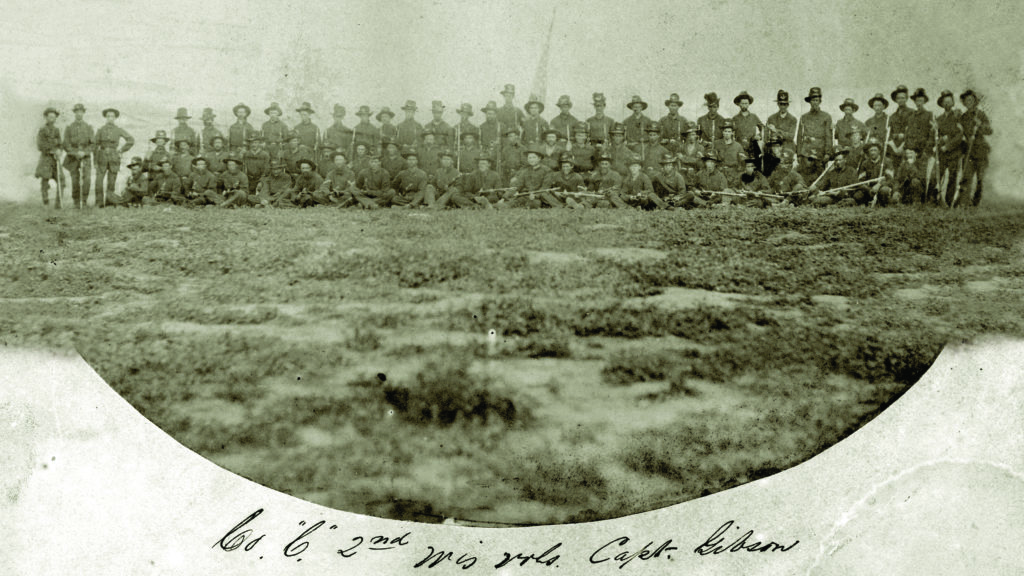
In the afternoon of July 1, the Iron Brigade and other hard-pressed Union 1st Corps regiments fell back to a line on Seminary Ridge. When Confederate assaults began to roll up the southern flank of this line, the Federals retreated through the streets of Gettysburg, the Iron Brigade ending the day on Culp’s Hill. Captain Otis remembered “as we lay down that night all hearts in the little remnant of the once powerful command, beat in sorrow and pain at the losses we had sustained.” Since all the field officers of the 2nd had fallen on July 1, Otis assumed command of the regiment for the remainder of the battle. According to a member of Otis’ company, the captain “conducted himself bravely through the fight…showing coolness and ability.”
After mustering out of service with the 2nd Wisconsin, Otis served briefly as a county clerk in Wisconsin before accepting a commission as major in the 8th U.S. Veteran Volunteer Regiment. Following the Civil War, Otis returned to being a journalist. In 1880, he wrote a history of the 2nd Wisconsin that appeared serially in the Milwaukee Sunday Telegraph. Morningside Press reprinted Otis’ regimental history, along with other significant sources on the 2nd, in 1984 in The Second Wisconsin Infantry, edited by Alan D. Gaff.
The letter published here, written by Otis to his father six days after the Battle of Gettysburg, appeared in the July 29, 1863, issue of the Mineral Point, Wis., Weekly Tribune. In the account, Otis mentions how he “deeply felt” the death of Sgt. Maj. George Legate. In Otis’ regimental history, he relates how he had known Legate “all through boyhood” in Mineral Point and that he was a “noble, brave soldier.” At Gettysburg, Legate sustained a flesh wound in the left thigh on the afternoon of July 1. Legate bound the wound with a narrow strap with a buckle given to soldiers by the state of Wisconsin as a “life preserver.” Unfortunately, he placed the strap below instead of above the wound “and in all probability buckled it too light.” Because Legate had fallen in an open field between the lines “with no possibility of obtaining help, mortification set in, and he died upon the field.” Like several thousand other Union dead, Legate filled a grave in what became Gettysburg National Cemetery. Some paragraph breaks have been added for readability, otherwise, Otis’ account is reprinted as it was originally written.
Head Quarters
2d Wisconsin Volunteers
Camp South Mountain Pass, MD.
July 9, 1863
Dear Father:
I presume you are anxiously waiting for a letter from me and wondering why I have so long remained quiet; and I doubt not, the stirring events of the last few days have caused a greater anxiety, to know whether I am still among the survivors of the great battles of the 1st, 2d and 3d of July.
Our march through Virginia and Maryland into Pennsylvania was very rapid. During that march we were continually in receipt of telegrams setting forth the sad havoc made by the Rebel army thro’ the different counties, and of here and there an accession to their numbers, besides we were constantly reminded of the threats of Lee’s army to whip the militia and if necessary the army of the Potomac. Not until the 28th or 29th ult., did we hear of the exact whereabouts of the invaders, and then we were full of misgivings, almost fearing an encounter, lest they outnumber us, two to one. On the 29th our Corps, (the 1st) reached within six miles of Gettysburg, where we encamped for the night. The next morning (the 1st inst.,) the “long roll” was beaten and the 1st army Corps advanced to Gettysburg.
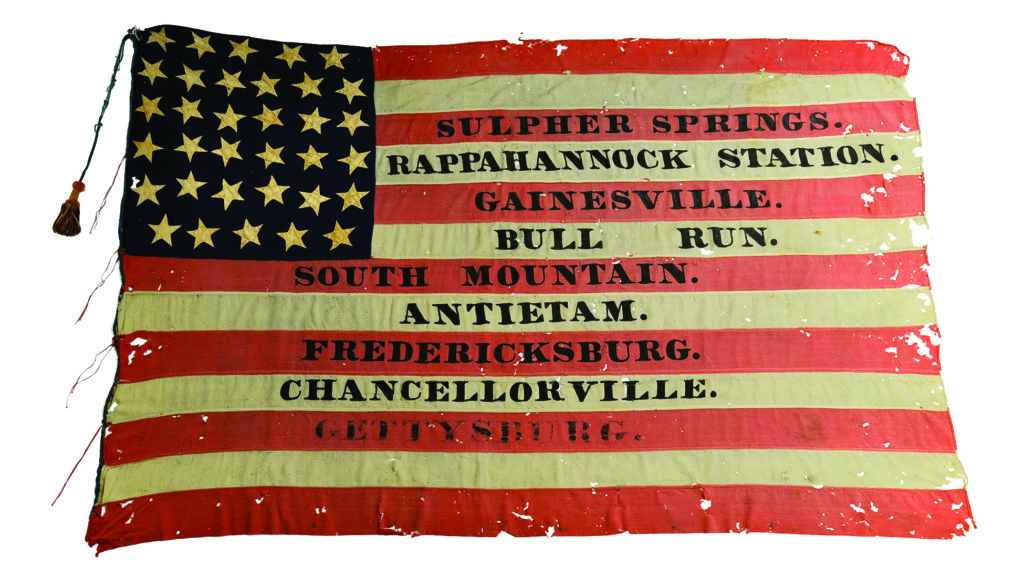
We had scarcely reached the city when the artillery opened, and upon an open field could be seen a line of rebel skirmishers advancing. Our Regt. was on the right of the Brigade and right of the Division. We had scarcely reached the battery and in supporting distance when we received an order to advance in line of battle and engage the enemy. No sooner did the Col. give the command “forward into line,” than the right started off at double quick, climbing a fence and into the woods, where halting, fixed bayonets, loaded and again on the double quick, advanced within range. From the time we struck the fence, until we had halted, the rebels poured an incessant fire into our ranks. As soon as the boys had got fairly at work, the rebels wavered and finally turned their backs and run—our Reg. in full pursuit. The Reg’t. in this short engagement captured over a hundred and fifty prisoners, among whom was Brig. Gen. [James J.] Archer.
Soon after we were joined by the Brigade and fell back across Marsh Creek, where we remained, with a part of the 11th corps attached to our line, until about one o’clock, when the rebels advanced upon us. Here we fought for more than an hour, until the left of our line had given way and we observed that the rebels were marching heavy columns of troops upon both our flanks—then we give way, but in good style, contesting as best we could every inch of ground. Four different times we urged the mass of human beings to rally around our colors and with our little band charge upon the advancing columns of the enemy. Our reg’t. had lost heavy, and it seemed as if but a handful of men were left.
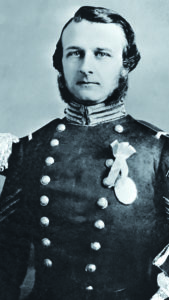
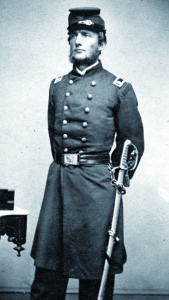
Col. [Lucius] Fairchild and Lt. Col. [George H.] Stevens were both wounded. We reached the battery and then fought as long as we had ammunition, and until we were ordered to the rear of the city. Maj. [John] Mansfield had been wounded by the battery and the command of the Reg. fell upon me. Geo. Legate had fallen upon the field and as it were lay between the two fires. Columns of the enemy were moving upon all sides of us and it seemed as if we were bound to be captured. In fact, I look upon the scene, thought of Bull Run, and wondered if such was to be the fate of this army. I imagined defeat as its portion in every strife, it mattering not how hard the troops fought, or how great was the energy displayed. You may well imagine the feelings of the badger boys, to be obliged to leave upon the field their dead and wounded comrades. But such is the misfortunes attending battles, as well as misfortunes of a soldier. This is the third or fourth time we have had to leave our dead and wounded to the mercy of our unfeeling foe, and I venture that very, very many of the wounded have died in consequence, and for want of a little humanity on the part of the Southern Chivalry.
The two corps (1st and 11th) reached the east side of the village, formed in line of battle, and threw up breast works, for better defence. During the fight of this day, our troops fought a force twice their number, and had that portion of the 11th corps acted as they should, I think the result could have been different, at least our loss could have been less and all could have retired in good order. As it was, the two corps were routed in perfect disorder. The loss on both sides was heavy—the enemy captured many prisoners, among whom was Lt. Wm. Noble, privates John Glanville, Thomas Pascoe, Mark W. Terrill, Ellis C. Taylor of my Company. Serg. Joseph O. Williams, privates M[oritz]. A. Haese [Hesse] and David W. Maffett [Moffitt] were killed. A list of the wounded I have sent to Mr. Bliss. The loss to my company was 28 killed, wounded and missing—to the Regt. 230 out of 276 that went into the fight. We are very small as a Regiment.
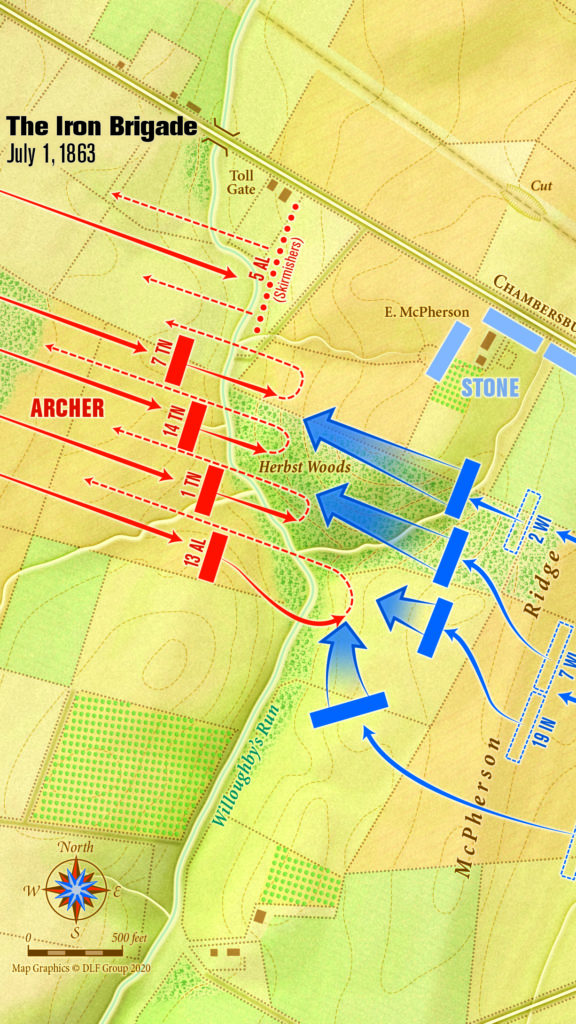
On Thursday the rebels attacked the left of our line and were repulsed each time with great loss. In the evening they attacked the right of our line and were repulsed. On the 3d they renewed the attack, and were driven on both flanks—in fact, they were perfectly routed and forced to seek shelter in the woods west of the town of Gettysburg, giving up our wounded, the city, and delivering upwards of 10,000 prisoners, 20 stands of colors, and arms of all kinds in abundance. Hundreds of their force delivered themselves up throwing down their arms and raising the white flag. The slaughter on both flanks was immense, and I believe the whipping given to Lee on the 2d and 3d was so thorough, that he will be unable to recover from it very soon. If his whole army is not destroyed this time, I very much mistake the lay of the ground and the disposition of our troops. In numbers we are all right, and for the quality of fighting material, the world is our judge.
I might write you page after page of instances during these three days, but my time is limited. We will have another battle at or near the Antietam field, and it will be the decisive battle for General Lee. It will end his army, mark my word.
I have many letters to write to those having friends and relations in the Company either wounded, prisoners or killed. Of the Company much might be said, and I cannot forbear mentioning the fact that never since I have been with them did I know of them doing nobler, or displaying a greater share of gallantry. They are brave boys, and cannot receive any too high consideration at the hands of the public.
The loss of Geo. Legate is deeply felt. With me he had been all that could be desired, and I regret his fate as much as any. Serg’t. Williams was another as was also M. A. Haese, both brave and good men. D. W. Maffett was from Mineral Point, but resided in Pennsylvania. He died within thirty miles of his home. Of the wounded, R[ichard]. L. Gidley, Luke Avery, Michael Walsh, J[ohn]. M. Furse, J[ames]. C. Perrine [Perine], J[erome]. F. Johnson, Wm. Loofborow, W. P. Smith, Chas. Derring [Doering], Joseph Webber [Weber], Chas. Milch [Milche], Otis Evans, Chris Kleine [Kline], W[illiam]. A. Owens, Thomas H. Rowland, Wm. Grant, and Alex C. Perry are each entitled to great praise, as is the whole Company. Nobly did each perform his duty. The wounded are all doing well, and will soon doubtless be with their friends.—Lt. [Alonzo] Bell and Lt. [William] Noble, each acted their part with great caution and coolness.—For my wounded, mangled comrades, none has a greater feeling, and my earnest prayer is for an early re-union at our homes, satisfied that they have performed their whole duty to the country and to themselves.
I escaped unharmed—one bullet passed through my coat flaps, another through my pants, neither of which harmed me in the least.
I shall prepare a report for the Soldiers Aid Society as soon as possible, which will be explicit and fuller in detail.
Give my love to all. Adieu. Geo. H. Otis.
Keith Bohannon is a professor of history at the University of West Georgia. He is the author of numerous articles and essays, including most recently an essay on General John B. Gordon in Gary Gallagher and Stephen Cushman, eds., Civil War Writing, New Perspectives on Iconic Texts (Louisiana State University Press, 2019).
This story appeared in the June 2020 issue of Civil War Times.

